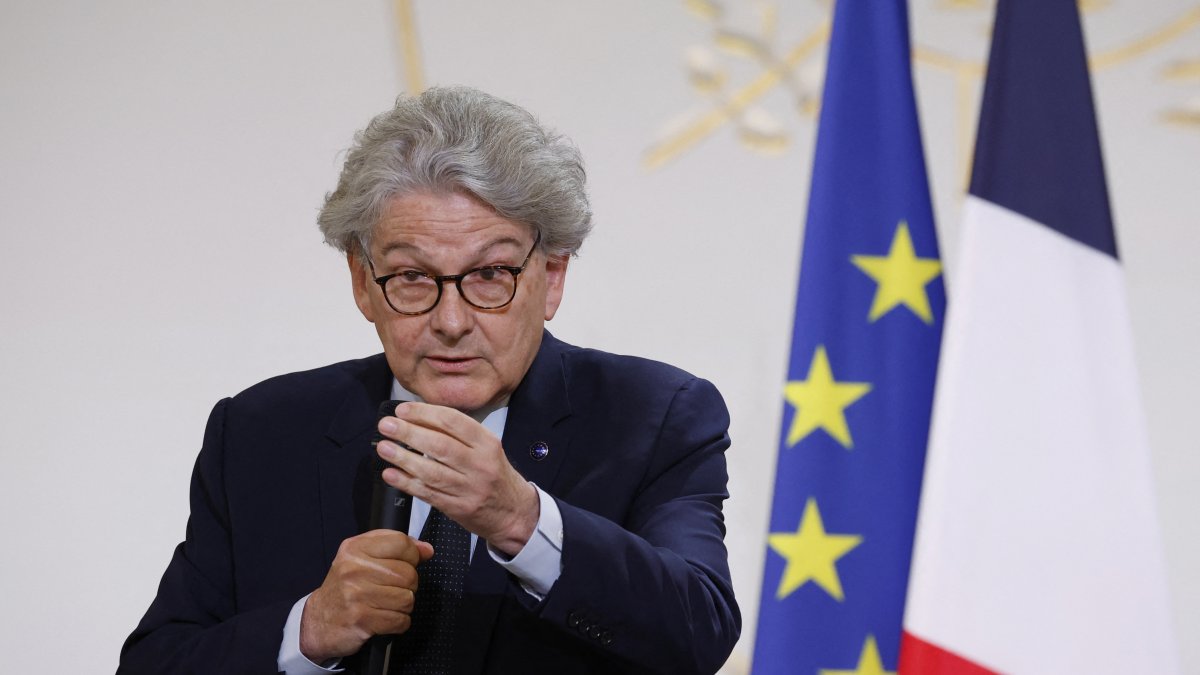Thierry Breton, the EU censorship czar who threatened Musk and X, resigns
The now former European Commissioner for the Internal Market accused European Commission President Ursula von der Leyen of going behind his back to get France to nominate another candidate for his post.

Thierry Breton, the EU's chief censor who threatened Elon Musk
French politician Thierry Breton, the EU censorship czar who threatened Elon Musk and his company X hours before the interview with former President Donald Trump came out, surprisingly resigned Monday from his post as European Commissioner for the Internal Market, accusing Ursula von der Leyen of "questionable governance."
According to Breton, his resignation comes after von der Leyen went behind his back to French President Emmanuel Macron in order to have him withdrawn as his candidate for commissioner.
In return, Breton's resignation letter reads, the European Commission president had promised France a more powerful role in the new Commission with a different French candidate.
Breton accused von der Leyen of partnering with Macron for personal interests without any justification.
"In light of these developments – further testimony to questionable governance – I have concluded that I can no longer exercise my duties in the College," Breton wrote. "I am therefore resigning from my position as European Commissioner, effective immediately."
I would like to express my deepest gratitude to my colleagues in the College, Commission services, MEPs, Member States, and my team.
— Thierry Breton (@ThierryBreton) September 16, 2024
Together, we have worked tirelessly to advance an ambitious EU agenda.
It has been an honour & privilege to serve the common European interest🇪🇺 pic.twitter.com/wQ4eeHUnYu
Breton's surprise resignation also comes amid a legal battle between the EU and Musk, with the official taking the spotlight for voicing threats against X and the U.S. billionaire himself in the run-up to his interview with Trump.
At the time, Breton published a threatening message against Musk and X in which he warned the platform that the interview with Trump could violate European Union regulations. Critics saw the letter as a clear attempt at censorship by the EU against X.
Indeed, some X officials celebrated Breton's resignation. One of them was Linda Yaccarino, the company's chief executive, who said in her profile, "It’s a good day for free speech."
It’s a good day for free speech. https://t.co/8HPGxmG4XP
— Linda Yaccarino (@lindayaX) September 16, 2024
According to various reports, Breton's letter against X and Musk upset many within the European Commission, as it was seen as a way to interfere in the U.S. election unnecessarily.
Officials close to von der Leyen, in fact, took to the press to criticize the then-commissioner anonymously.
"The EU is not in the business of electoral interference," one EU official said at the time. "DSA implementation is too important to be misused by an attention-seeking politician in search of his next big job."
The Digital Services Act, backed by Breton, is a broad EU effort to regulate content within the world's largest social and technology platforms. Critics see it as a regulation that infringes on freedom of expression.
According to the Wall Street Journal, while Breton had become the European official to adopt the most public and critical profile against big tech companies, becoming an antagonist to big businessmen like Musk, his departure is unlikely to change the EU's approach to regulating online content, which they see as necessary to control what they believe is problematic behavior by social platforms.
Breton's departure also presents a relative problem for von der Leyen, who wanted to lead a smooth transition between his first and second terms as president of the European Commission, the bloc's executive body.
On Breton's accusations against him, the European Commission had no further response to defend its leader, accepting the resignation of the now former commissioner in a public statement.
"The president takes note and accepts Thierry Breton’s resignation and thanks him for his work as commissioner throughout the mandate, in particular for the advances on the digital services act, the digital markets act and other important digital and industrial files," the European Commission said.
Almost immediately following the resignation letter, Macron's office announced that it will propose a new candidate for the post of European Commissioner for the Internal Market: Stéphane Séjourné, Minister for Europe and Foreign Affairs.
In his announcement, Macron highlighted the minister's work as a representative of the Renew liberal party in the European Parliament.
"The President of the Republic, in agreement with the Prime Minister, has proposed Mr. Stéphane Séjourné, Minister of Europe and Foreign Affairs, as European Commissioner for the next legislature," read the statement. "His commitment to Europe will allow him to fully support this agenda for sovereignty."



























